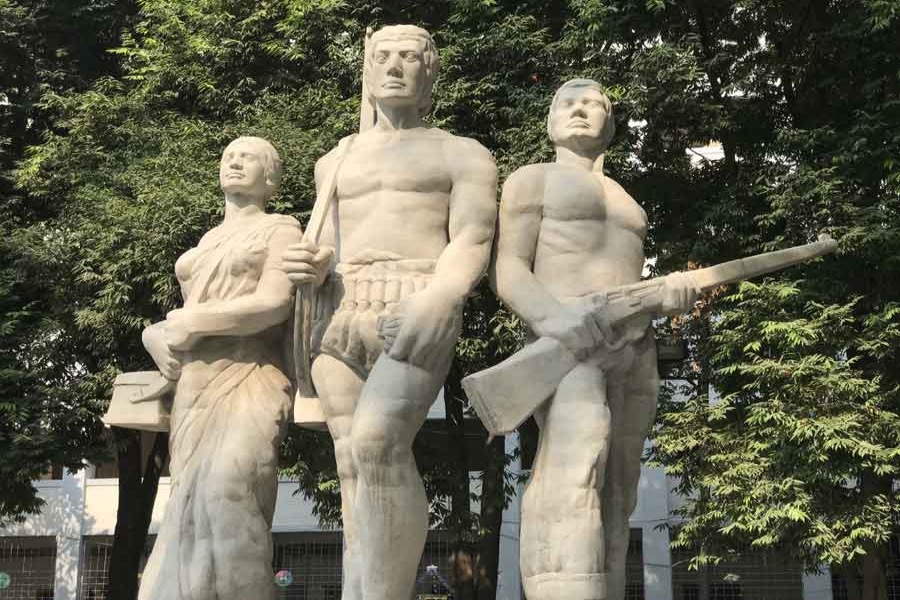Nothing was impossible in our Dhaka University domain of the first few years. From morning till late night, we studied and talked about ideas to make a different world. A pluralistic Bangladesh was a dream. Living in dormitory rooms - often crowded, sometimes lonely - we dared to believe, great thinkers and leaders had left assignments for us to pursue ideals that were yet to come true!
Friends were the closest ones in that life that offered each morning for fresh learning, afternoon for celebration, and evening for sharing any new knowledge. The atmosphere was vibrant, more than for academic pursuits. Almost all students used to read something, but not necessarily for higher score. Some groups were engaged in sheer funs.
Foods weren't so ideal at dorms, so residents followed a 'plain living, high thinking' philosophy. Enterprising youths tested their aptitude through reciting poems, acting, singing, writing, joining sports, volunteering, learning foreign language, working as interns, and doing politics.
The university's blessing was a pool of raw talents, coming mostly from mufassil (rural and peri-urban) areas of Bangladesh. They eventually formed the national ethos, bore a standard and nursed in them future leadership. The dominant culture entailed rejection of any evil force. Elitism, whenever understood, was least acceptable. Smartness was one's approach, not merely studiousness or bright attires.
The campus violence during the dictatorial rule couldn't stop free thinking and a collective resolve to break the shackles of misrule. And it happened as General Ershad relinquished power in the face of massive student protests in 1990.
It was a selfless movement overlooking major parties' failure to reach a consensus on ending his autocratic rule. On November 28, quarantined by law enforcers, a few thousand boys and girls moved out of dormitories and assembled at TSC; that was a romantic adventure - we violated curfew. This scribe was about to be shot in the head when the procession was crossing the Supreme Court area.
It was a time that proved to be transitional. Nations were sensing freedom from cold war hostilities with a new wave of democracy worldwide. Bangladesh held the freest and fairest elections in its history in 1991.
We also witnessed a shift in debates on the campus - from ideology to individual career building. However, despite heartbreaking for losing some dreams, we remain a generation of democratic aspirations, the window of Bangladesh in the 1980s and 1990s.
The University of Dhaka was such an obsession that many of us appeared in enrolment test nowhere else. Inmates of dorms suffered financial hardship; still our mentors insisted on not doing anything for earning money sacrificing adda (rendezvous) and time to read textbooks. Friendly seniors gave another piece of advice - choose your life partners from here.
A BUET friend visited us regularly, to 'experience how aesthetically you guys speak'. In our final year before Bachelor's exam, a doctor of Dhaka Medical College Hospital, who happened to be a classmate's brother, asked us how the university life felt like but interrupted by saying: "It's too early to reflect on such glorious days."
With 99 years completed since the university's inception in 1921, numerous alumni reminisced their campus days in social media posts. From our perspective, let's recognise, it might not have been possible for most of us to study without the support of taxpayers' money. We still feel happy recalling the way people owned this premier university.
On a university day in 1989, an elderly rickshaw-puller started dancing near the central library. Finding a few students struggling to share money before travelling, a medicine seller at Shahbagh extended helping hand with change of notes. A little boy of Madhu's Restaurant (popularly called Madhur Canteen) often waited for us to serve sweetmeat.
The year (1994) we completed Master's degree, a batch-mate said, "Some of us would be dignitaries, maybe, holding the highest office. But, we are passing the most joyous days of our life." Years later, we realise we are in another world and how big our alma mater was.


